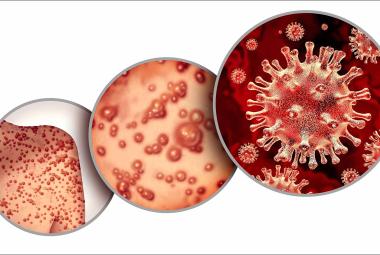A recent study has suggested that use of probiotics in pregnancy and breastfeeding may reduce the risk of eczema in infants.1 Eczema, also known as atopic dermatitis, is the term broadly applied to a range of persistent skin conditions which include dryness and recurring skin rashes characterized by: redness, skin edema (swelling), itching, crusting, flaking, blistering, cracking, oozing, bleeding and areas of temporary skin discoloration. Eczema is a common condition in children. In 2003 in U.S.A, 10.7% of children were reported to have diagnosis of eczema.2
This study included 241 mother-infant pairs. Mothers with allergic diseases and atopic sensitization were randomly assigned to receive probiotics containing following microorganisms (1) Lactobacillus rhamnosus (LPR) and Bifidobacterium longum BL999 (LPR+BL999), (2) L paracasei ST11 and B longum BL999 (ST11+BL999), (3) placebo. Subjects started receiving probiotics 2 months before delivery and during the first 2 months of breastfeeding. The infants were followed until the age of 24 months. The risk of developing eczema during the first 24 months of life was significantly reduced in infants of mothers receiving LPR+BL999 (odds ratio [OR], 0.17) and ST11+BL999 (OR, 0.16). No adverse effects were reported following the use of probiotics in these mothers.
It has been suggested in another study that probiotics may exert their effect by modulating intestinal microorganisms composition or by directly stimulating the intestinal immune system.3
In pregnant women, probiotic supplementation may modulate the composition of vaginal and intestinal microorganisms, which provide an important colonizing inoculum to the newborn infant and thus may have an effect on neonatal gut colonization. Similarly, another study has suggested that maternal mucosal contact with the microorganisms during pregnancy may alter placental innate immune gene expression and could protect the offspring from asthma and allergic diseases, in an animal model system.4,5
Studies have suggested that, maternal probiotic supplementation during breastfeeding may modulate disease risk in the infant. Although nonspecific microbial transfer from the mother through nursing and skin-to-skin contact occurs, these studies suggest that maternal probiotic intervention exerts its effect via specific alterations of the immune properties of breast milk.6,7
It has been suggested that maternal consumption of L rhamnosus GG containing probiotics during pregnancy and breastfeeding may increase the concentration of the immunomodulatory cytokine transforming growth factor (TGF-b2) in breast milk and may be associated with reduced risk of eczema in the infant. TGF-b2 modulates immune responses in the immature human gut and promotes immune maturation.8,9 The researchers have hypothesized that probiotic intervention during lactation may change this process and support a healthier immune system in the gut, and promote growth of beneficial intestinal microorganisms.10
Thus, all of these studies suggest that, maternal use of probiotics during pregnancy and breastfeeding may reduce the risk of eczema in infants.
Sonia Shoukat M.D.
Thomas W. Hale Ph.D.
InfantRisk Center
References:
1) Samuli Rautava, Essi Kainonen, Seppo Salminen, Erika Isolauri. J Allergy Clin Immunol. 2012 Oct 16. pii: S0091-6749(12)01464-9. doi: 10.1016/j.jaci.2012.09.003.
2) Shaw TE, Currie GP, Koudelka CW, Simpson EL. Eczema prevalence in the United States: data from the 2003 National Survey of Children's Health. J Invest Dermatol. 2011 Jan;131(1):67-73. Epub 2010 Aug 26.
3) Rautava S, Kalliom€aki M, Isolauri E. New therapeutic strategy for combating the increasing burden of allergic disease: probiotics–a Nutrition, Allergy, Mucosal Immunology and Intestinal Microbiota (NAMI) Research Group report. J Allergy Clin Immunol 2005;116:31-7.
4) Mold JE, Michaelsson J, Burt TD, Muench MO, Beckerman KP, Busch MP, et al.Maternal alloantigens promote the development of tolerogenic fetal regulatory T cells in utero. Science 2008;322:1562-5.
5) Dotterud CK, Storrø O, Johnsen R, Oien T. Probiotics in pregnant women to prevent allergic disease: a randomized, double-blind trial. Br J Dermatol 2010;163:616-23.
6) Kim JY, Kwon JH, Ahn SH, Lee SI, Han YS, Choi YO, et al. Effect of probiotic mix (Bifidobacterium bifidum, Bifidobacterium lactis, Lactobacillus acidophilus) in the primary prevention of eczema: a double-blind, randomized, placebocontrolled trial. Pediatr Allergy Immunol 2010;21:e386-93.
7) Rautava S, Kalliom€aki M, Isolauri E. Probiotics during pregnancy and breastfeeding might confer immunomodulatory protection against atopic disease in the infant. J Allergy Clin Immunol 2002;109:119-21.
8) Rautava S, Nanthakumar NN, Dubert-Ferrandon A, Lu L, Rautava J, Walker WA. Breast milk-transforming growth factor-b2 specifically attenuates IL-1b-induced inflammatory responses in the immature human intestine via an SMAD6- and ERK-dependent mechanism. Neonatology 2011;99:192-201.
9) Rautava S, Lu L, Nanthakumar NN, Dubert-Ferrandon A, Walker WA. TGF-b2 induces maturation of immature human intestinal epithelial cells and inhibits inflammatory cytokine responses induced via the NF-kB pathway. J Pediatr Gastroenterol Nutr 2012;54:630-8.
10) Rautava S, Luoto R, Salminen S, Isolauri E. Microbial contact during pregnancy, intestinal colonization and human disease. Nat Rev Gastroenterol Hepatol 2012.







